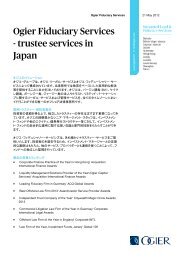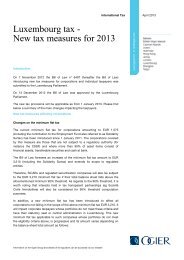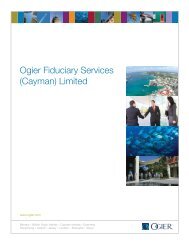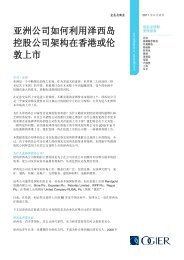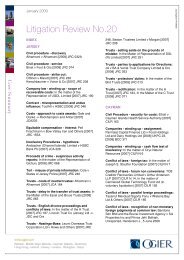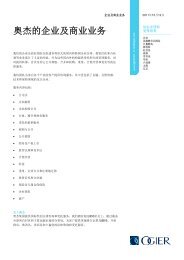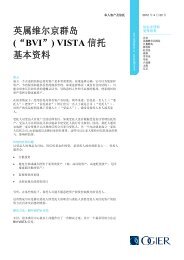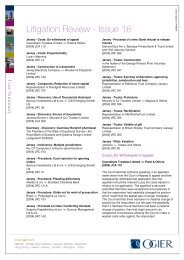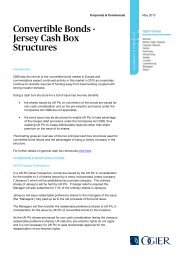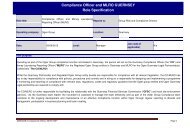Litigation Review - No. 19 - Ogier
Litigation Review - No. 19 - Ogier
Litigation Review - No. 19 - Ogier
You also want an ePaper? Increase the reach of your titles
YUMPU automatically turns print PDFs into web optimized ePapers that Google loves.
April 2008<strong>Litigation</strong> <strong>Review</strong> - <strong>No</strong>. <strong>19</strong>Case Summaryfirst, he submitted that the effect of Article 9 (asamended) was to render the English order unenforceableon the basis that the finding that the B Trust was a postnuptialsettlement was inconsistent with Jersey law.Secondly, he argued that the jurisdiction to enforce aforeign judgment on the basis of comity had beenremoved on a proper interpretation of the new Article9(4), which provided that no foreign judgment withrespect to a trust would be enforceable to the extent thatit was inconsistent with the TJL irrespective of anyapplicable law relating to conflicts of law.The Court rejected both arguments of the husband. Itinclined to the view that the B Trust was not a post-nuptialsettlement under Jersey law but found that in the contextof the provisions of the B Trust, it was clear that questionsrelating to the exercise of the trustee’s powers ofadministration and appointment were to be governed byEnglish law. It was not concerned with the questionwhether the B Trust was a post-nuptial settlement, norwas it being asked to vary the trusts of the B Trust. It wassimply exercising a jurisdiction under Article 51 of the TJLto give directions to a trustee which had sought theassistance of the court. Its function was to decidewhether and if so, to what extent, to give effect to theconclusions at which the English court arrived and indoing so, it would apply Jersey law.should be the normal costs order in a case where atrustee fails in its fiduciary duty in this way, so that theloss should not fall on the beneficiaries.Trusts - recognition of English constructivetrustsPlane v Jones [2006] JCA 127This case involved a claim by a beneficiary of a trust foran order that the trust fund be distributed and terminatedas to part, to reflect her claim that she had in fact held abeneficial interest in three properties prior to theirsettlement into the trust by her partner.The Court of Appeal considered the nature of the interestthe claimant had in the properties as a matter of Englishlaw (as the trust property was located in England) andconfirmed, following English authority (Lloyds BankLimited v Rosset [<strong>19</strong>91] 1 AC 107 and Grant v Edwards[<strong>19</strong>86] Ch 638) that a constructive trust in property mayarise where there was express agreement of the relevantparties and an act by the claiming party to its detriment,or alternatively, where a common intention can beinferred by conduct (which would typically arise wherethere had been a contribution to the purchase price orpayment of mortgage instalments).The Court also rejected the argument that a properinterpretation of Article 9(4) dispensed with the jurisdictionto enforce a foreign judgment on the basis of comity. TheBailiff held that although the meaning of Article 9(3)(which provides that the law of Jersey relating to … (b)conflicts of law shall not apply to the determination of anyquestion mentioned in paragraph (1) [including, e.g. theadministration by a trustee of a trust] unless the settlorwas domiciled in Jersey), when read in conjunction withArticle 9(4), was unclear, he was quite sure that neitherparagraph excluded the application of the doctrine ofcomity, which was after all simply a question of goodjudicial manners.In exercising its discretion under Article 51 of the TJL, theCourt had regard to the interests of all the beneficiaries ofthe B Trust and decided to give effect to the Englishorder.Trusts - handover of trust documents onretirement<strong>Ogier</strong> Trustees Limited v CI Law TrusteesLimited & Ors [2006] JRC 158In circumstances where the defendant, as outgoingtrustee, had failed to provide a full and proper handoverof trust documents to enable the incoming trustee toidentify and gather in the assets of the trust,notwithstanding that the documents were eventuallyprovided, the failure to provide documents by way of atimely handover would amount to a breach of fiduciaryduty and indemnity costs were awarded against theoutgoing trustee. The Deputy Bailiff commented that thisTrusts - removal of trusteeEiro v Equinox Trustees Limited [2006] JRC1<strong>19</strong>One set of beneficiaries applied to remove the Defendantas trustee of a trust on the ground that they had lost faithin the trustee and that it had behaved incompetently tosuch an extent that its removal from office was justified.The Court held that the legal test for the removal of atrustee was the same as that under English law: thegeneral principle guiding the court in the exercise of itsjurisdiction is the welfare of the beneficiaries and thecompetent administration of the trust in their favour.Although positive misconduct will always justify theremoval of the trustee who has abused his trust, it is notevery mistake or neglect of duty or inaccuracy of conducton the part of the trustee which will do so: subject to thegeneral guiding principle the act or omission must besuch as to endanger the trust property or to show a wantof honesty, or a want of proper capacity to execute theduties, or a want of reasonable fidelity.The allegations of incompetence on the facts amountedto a suggestion that during a certain period the Defendanthad not taken sufficiently active steps to remedy thedefects of administration on the part of their predecessor.However, the evidence showed that in fact the Defendanthad taken steps to investigate and remedy the defects atits own expense (as the trust had no liquid assets). Thus,the Court was satisfied that the Defendant had performedits duties competently.ADMIN-14369297-2



